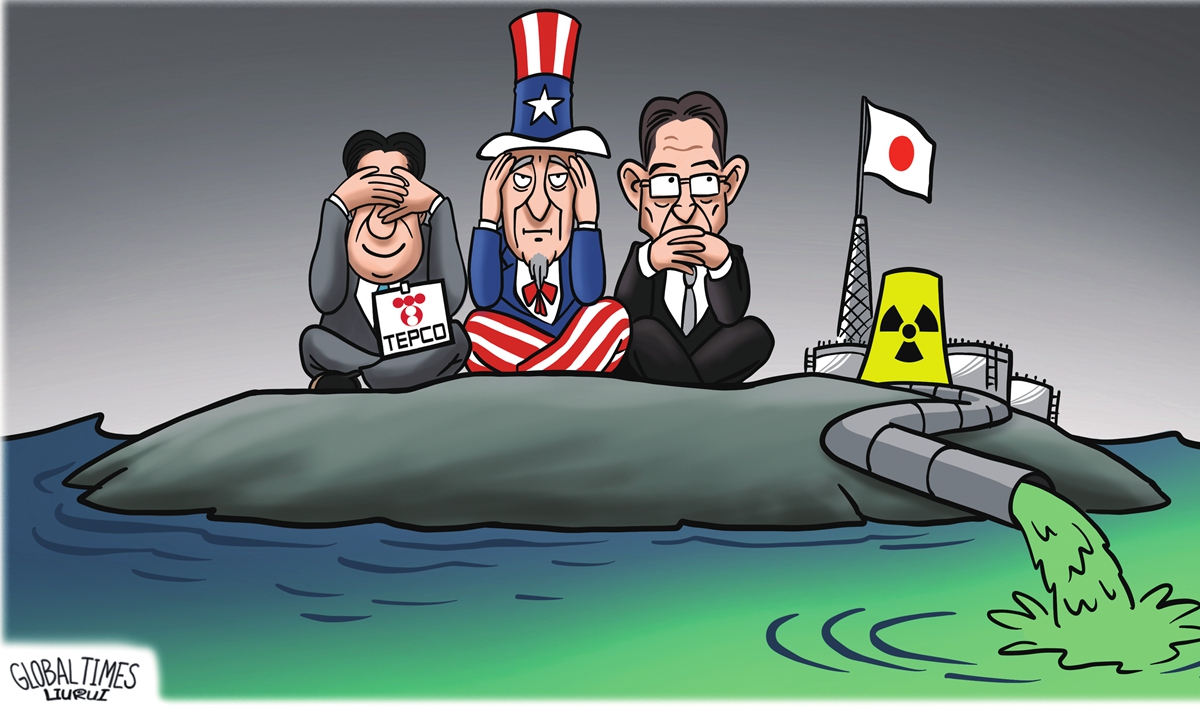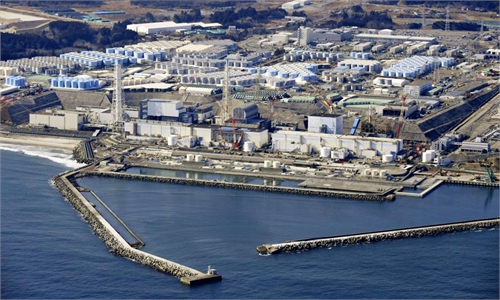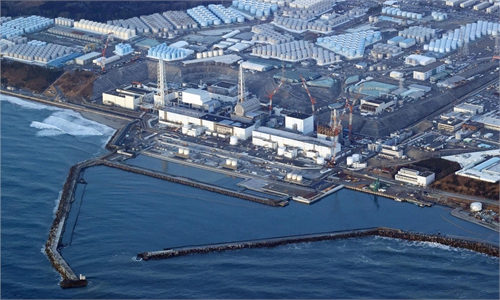Japanese groups voice growing opposition, organize rallies over govt's nuclear-contaminated water dumping plan decided one year before

Illustration: Liu Rui/GT
Several Japanese groups voiced growing opposition and organized rallies on Wednesday against Japan's plan to release contaminated wastewater from the Fukushima nuclear plant into the sea, marking one year after Japan's decision.
The Japanese government turned a deaf ear to waves of opposition from Japan and surrounding countries including China and South Korea, as it aims to move ahead with the plan, Chinese experts said, noting that international society should request the International Court of Justice (ICJ) to issue an advisory opinion on the illegality of the planned release and collect scientific evidence such as nuclear-related data.
Oda Chiyo, a representative of a Japanese environmental protection group, told the Global Times on Wednesday that the group organized national rallies on Wednesday in regions including Tokyo and Fukushima against the Japanese government's decision, and their actions will not stop until the government revokes its decision.
Chiyo said that they were shocked and disappointed hearing the government's decision, and their voices were ignored.
What made Japanese residents angry was that the government distributed flyers to primary school students, claiming the diluted, nuclear-contaminated water was safe.
A Fukushima resident surnamed Kataoka told the Global Times on Wednesday that the Japanese government's move was a kind of mind control, and she was strongly opposed to it.
Last week, during the first meeting between the head of Japan's national fisheries cooperatives and Japan's prime minister since April last year when the decision to release the contaminated water was made, Hiroshi Kishi, head of the cooperatives, said the group remained firmly opposed to the plan due to concern over the negative impact on the industry, Kyodo News reported.
Four civil organizations in Japan's Fukushima and Miyagi prefectures submitted a petition signed by about 180,000 people to the Ministry of Economy, Trade and Industry and Tokyo Electric Power Co on March 30 to express their opposition to releasing the nuclear-contaminated water from the Fukushima power plant into the sea and demanded other disposal plans.
Surrounding countries including China and South Korea have voiced their strong opposition repeatedly in the past year.
Zhao Lijian, spokesperson of Chinese Foreign Ministry, said at Wednesday's media briefing that the Japanese government turned a deaf ear to all the opposition, without any convincing explanation on the legitimacy of the discharge program, the data reliability of the contaminated water, the effectiveness of purification devices, and the uncertainty of the environmental impacts.
Zhao urged Japan to deal with the nuclear wastewater from the Fukushima nuclear plant in an open, transparent, scientific and safe manner, saying it must not start discharging the water into the sea before a proper solution is fully discussed and agreed on by neighboring stakeholder countries and relevant international institutions.
The operator of the Fukushima plant - Tokyo Electric Power Co - plans to build an undersea tunnel and start releasing the water about one kilometer off the coast around spring next year, NHK reported on Wednesday. The company said it hopes to begin construction work around June, pending Nuclear Regulation Authority approval, the report said.
Chang Yen-chiang, director of the Yellow Sea and Bohai Sea Research Institute of Dalian Maritime University, who has been closely following the Japanese government's decision, told the Global Times that Japan may immediately start releasing wastewater once it finishes building the tunnel to avoid dealing with further leaks triggered by earthquakes, and the release may be earlier than spring 2023.
It is necessary for the international community to stop this, and one of the keys is to prove that Japan would be violating its international legal obligations, Chang said, noting a better strategy would be to first request the ICJ to issue an advisory opinion on the illegality of the planned dumping.
Chang suggested that China and other countries concerned including South Korea, Russia, North Korea and Pacific island nations conduct close communications, and prepare to initiate motions at the UN General Assembly and other UN agencies.
He said China should step up the collection of scientific evidence and strive for an advisory opinion from the ICJ. It's necessary for us to quicken the collection of fishery materials and the monitoring of nuclear-related data in coastal areas, so as to make a before-and-after comparison and calculate compensation, he said.
Shaun Burnie, a senior nuclear specialist at Greenpeace East Asia, told the Global Times that the decision to release the wastewater into the Pacific Ocean will brings the risk of more dangerous nuclear debris.
Burnie said the discharge of wastewater into the ocean is not the only option for dealing with it, adding that the Japanese government once admitted that there is enough space near the Fukushima Daiichi nuclear power plant and areas around Fukushima prefecture to build more storage facilities for the water.



